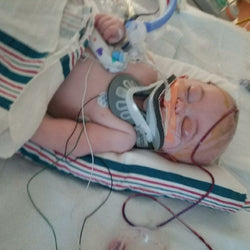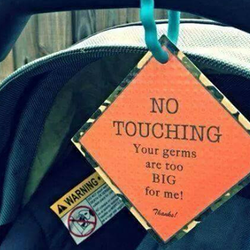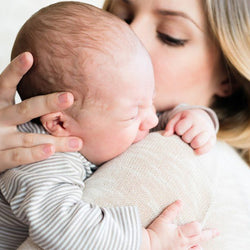AAP & the Babywise Controversy: Misattributions and Corrections

by Babywise.life
Jul 05, 2016
Any discussion about attachment parenting vs baby scheduling is a polarizing one. Add in sub-topics like feeding philosophies and sleep training, and you are square in a space where both parents and professionals alike hold very strong and divergent opinions.
In this light, negative criticism of the perennial 20-year #1 bestseller On Becoming Babywise is not difficult to find. The authors and publishers of Babywise are not surprised by this. Perhaps the loudest and most oft-repeated (and mistaken) criticism of Babywise is credited to the American Academy of Pediatrics.
More: Common Myths & Misconceptions About the Babywise Method
The AAP is a reputable professional association, tasked with serving nearly 60,000 members in sound pediatric medical practice. So if you’re a parent investigating resources for sleep training and feeding and you see Babywise associated with words like Warning, Danger, Dehydration, weight loss, FTT… and apparently by the AAP, why not? Whoa, sound the alarm!
Unfortunately, as we demonstrate below, the entire “AAP against Babywise” soundbite (despite its widespread distribution) is highly inaccurate, misleading and misattributed. It is repeated both by informed opponents of the parenting style and by well-intended parents who are trusting what they read on the internet but appear to have read neither Babywise nor the AAP on the topic. We don’t think the AAP could have possibly anticipated that when it allowed a 3-page internal discussion between disagreeing pediatricians, that the AAP would be incorrectly attributed (on such a widespread basis) as having issued some kind of official warning against babywise, when it did not.
Whatever the case, regarding the AAP & the Babywise controversy we encourage all parents to evaluate both sides, ask their own pediatrician and arrive at their own conclusion. To that end, we think there are a few obvious points on the matter that provide important perspective:
1. The “AAP is Against Babywise” soundbite is mis-attributed to the AAP as a whole.
The original source of the entire “AAP warns against babywise” campaign is a 1-page ‘commentary’ by an AAP candidate fellow Dr Matthew Aney in the April 1, 1998 Issue of AAP News, provocatively titled, ‘Babywise’ advice linked to dehydration, failure to thrive” in which he raised concern about this new resource on the market. Critics love to quote from the ‘Abstract.’ To the layman, this may suggest a lengthy scientific study in a peer reviewed medical journal, establishing an AAP official position. It is none of these. AAP News is an internal newsy publication where pediatricians can voice their personal opinions on a single page in the ‘commentary’ section. Dr Aney’s personal opinions are strictly that, and they do not constitute a formal study, a peer review committee, a resolution, a policy statement or anything that can be remotely attributed to the AAP as a whole — a key fact that is always omitted by babywise critics. Despite all this, Dr Aney’s personal opinions are repeated ad nauseum as if they represented the prestigious AAP as a whole. It is just not true. The AAP has never issued any kind of study, review or warning against babywise.
2. Dr Aney’s Criticism of Babywise is rebuked by several other AAP Pediatricians in the very same AAP publication.
This equally important fact is also never included in the repeated critical soundbite. If you simply read the AAP’s editor on the topic, the rebuttle to Dr Aney and the six 2nd opinions, you get a completely different flavor. We encourage every parent to read the entire discussion for themselves, and we believe it will leave you puzzled at how an anti-babywise soundbite could be incorrectly repeated by so many as an official position of the AAP, when it is not. Unfortunately for interested parents, access to the full discussion is not free. One has to be a member of the AAP (or pay $12 per article or $45 for 2 days access) to read them in their entirety. The other option is for the interested party (us) to pay AAP an annual license fee per full article just to link to the important content. We have done that below. We have paid the AAP a significant annual license fee to provide access to the complete discussion, from this article.
Some context here is helpful. The entire and complete “discussion” of babywise in AAP publications is confined to these 3 pages during 1998:
- Page 1: Dr Aney’s 1-pg *Personal Opinion (AAP News, April 1998). Login credentials required*
- Page 2: *Babywise Co-Author, Pediatrician Dr Robert Bucknam’s invited rebuttal. Login credentials required*
(May 1998 issue of AAP News). We have reprinted (with paid permission) Dr Bucknam’s complete rebuttle article here.
- Page 3: 2nd opinions from six AAP Pediatricians Login credentials required*
We have also paid the AAP a significant license fee just to link to the full article here. To our knowledge, this is not available anywhere else.
To help point the way, we have also highlighted some quotations from the 2nd Opinions article, clearly showing that while some pediatricians disagree, AAP as a whole is neutral on Babywise
I have been successfully using On Becoming Babywise in my general pediatric practice for the last several years. I have found it to be a very helpful resource for parents. I think any negative outcomes associated with this material is due to the misapplication of the principles.
~~ Dr Thomas Gill, Pediatrician, Johnson City, TN
“On Parenting Styles” July 1, 1998 AAP News
“I have not seen any babies in my practice who have failed to thrive or have had problems with dehydration due to Ezzo’s material… I would think that many of the reported failure to thrive cases were due to misapplication of the principles involved. This misapplication can happen with any instructional material and should not be used to criticize the Ezzos…. My knowledge of this material is not secondhand. I have read, listened to, used and taught this material myself… I think it is time that we as pediatricians are open-minded enough to look objectively at material such as Babywise without feeling threatened. We might just find that most of their information is bringing us back to what our own parents called “just good old, common-sense parenting.”
~~ Dr. James M Pearson, MD, FAAP, Johnson City, TN
As you can read in their entirety at the links provided above, the other three responses include (1) a predictable Babywise critique by Dr William Sears, the well-known and articulate proponent of attachment parenting, (2) a more neutral response by Marvin Elger which essentially also refers readers to the AAP Dec 1997 policy statement on Breastfeeding, which we believe Babywise is completely compatible with, and finally, (3) a reply from a pediatrician who admits upfront that his personal philosophy is diametrically opposed to that in the Babywise, but who also gives a very fair review. His advice to pediatricians is the same we would suggest to all parents.
3. Dr Aney’s original criticism was aimed at an early edition, which has since undergone 20 years of development and 5 updates.
Perhaps the Dr Aney’s most valid criticism was that several areas of the babywise program did not adequately provide medical support. Even Dr Bucknam acknowledged the work in progress in his May 1998 rebuttal article:
“We realize that some statements found in the first edition needed further clarification and in some cases, minor corrections. We thank our critics for pointing them out. The second edition of “Babywise” due out in May 1998 addresses these concerns.”
Subsequent editions of the book (including the current 5th edition) made great efforts to provide additional medical reference materials, quotations of studies, as well as careful repetition of context, disclaimers and common sense. This is no different than any book containing medical information, which receives updates after its initial debut. While the original concern raised grew into a repeatable soundbite, the actual substance is less applicable some 20 years and 5 editions later.
Shop
Article Continues Below Advertisement
4. AAP then-Executive Director Joe Sanders contextualized the discussion and quotes from the only relevant AAP Policy Statement (which is compatible with Babywise).
We believe the takeaway from Dr Sanders four-paragraph introduction to the 2nd opinions is summarized by the following 4 quotes or points:
- “AAP News recently (April, May 1998) presented both sides (our emphasis) of a discussion” about the book “On Becoming Babywise”
- “The Commentaries evoked many impassioned responses from members and non-members alike.” Very predictable for this topic.
- He reiterates that Dr Aney’s + Dr Bucknam’s + 6 responses comprise the conclusion of the print discussion of the issue, i.e. There was no new position taken, no warning, no specific AAP directive, and no further discussion or exploration was expected. Indeed, if you search the AAP database, the topic does not come up again. The 3 articles above are it.
- Dr Sanders simply quoted from the only relevant AAP Policy statement, (Pediatrics, Dec 1997) which babywise authors continue to demonstrate is completely compatible with the Babywise approach.
In sum, the AAP has issued many rebukes and warnings on many topics over the years, but Babywise has not been one of them.
CONCLUSION
The authors and publishers acknowledge that no program will be perfect for every baby and family, and that each family must take into account both their pediatricians advice as well as their own review of the methods available and make the best choice for their family. If this article encourages even one additional family to give Babywise a complete review instead of passing it over because of misinformation, then we will have achieved our goal.
Read more
Article Continues Below Advertisement








